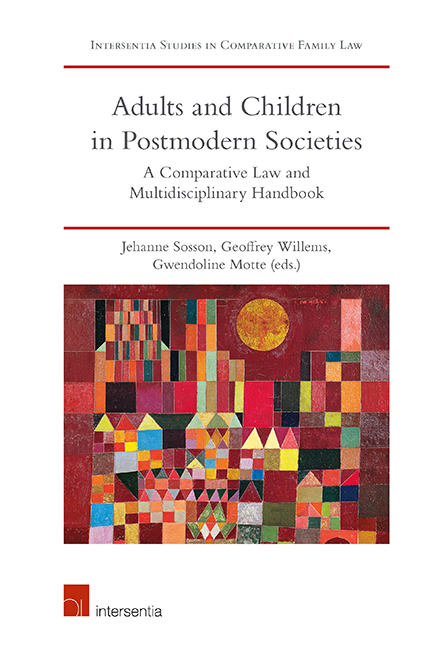Book contents
- Frontmatter
- Contents
- List of Cases
- List of Contributors
- Introduction
- PART I NATIONAL REPORTS ON LEGAL REGULATIONS OF RELATIONSHIPS BETWEEN ADULTS AND CHILDREN
- Questionnaire
- Models
- Algeria
- Argentina
- Australia
- Belgium
- Canada
- Democratic Republic of the Congo
- England and Wales
- France
- Germany
- Ireland
- Italy
- Japan
- The Netherlands
- Romania
- Spain and Catalonia
- Sweden
- Switzerland
- United States of America
- PART II INTERDISCIPLINARY APPROACH
- PART III INTERNATIONAL LAW INSIGHTS
- PART IV COMPARATIVE APPROACH
- General Conclusion: The Challenge of Transparent and Inclusive Parenthood/Parentality in a Pluralist and Cosmopolitan Context
- About the Editors
Italy
from PART I - NATIONAL REPORTS ON LEGAL REGULATIONS OF RELATIONSHIPS BETWEEN ADULTS AND CHILDREN
Published online by Cambridge University Press: 26 June 2019
- Frontmatter
- Contents
- List of Cases
- List of Contributors
- Introduction
- PART I NATIONAL REPORTS ON LEGAL REGULATIONS OF RELATIONSHIPS BETWEEN ADULTS AND CHILDREN
- Questionnaire
- Models
- Algeria
- Argentina
- Australia
- Belgium
- Canada
- Democratic Republic of the Congo
- England and Wales
- France
- Germany
- Ireland
- Italy
- Japan
- The Netherlands
- Romania
- Spain and Catalonia
- Sweden
- Switzerland
- United States of America
- PART II INTERDISCIPLINARY APPROACH
- PART III INTERNATIONAL LAW INSIGHTS
- PART IV COMPARATIVE APPROACH
- General Conclusion: The Challenge of Transparent and Inclusive Parenthood/Parentality in a Pluralist and Cosmopolitan Context
- About the Editors
Summary
CHANGES IN THE TRADITIONAL FAMILY
A. MOTHERS
1. Is maternity automatically established by the birth certificate?
In Italy, maternity is not automatically established by the birth certificate. In a parenthood obtained without any help of medical techniques, the woman who gives birth can avoid assuming legal maternity by exercising the right to give birth in anonymity, recognised by Art. 30 of D.P.R. n. 396/2000, relevant to the Regulation of Marital Status.
Otherwise, maternity is established through recognition made by the woman, which the birth certificate is annexed to, stating that she gave birth to the child.
If the mother is married, just the introduction of her name is equivalent to recognition.
On the contrary, if she is not married, the introduction of her name does not imply any recognition, which must be expressed.
Such recognition can also be made after the birth, until the child is declared free for adoption and granted to a couple for adoption. To give an example, it can happen that a child at birth is recognised only by his/her father; in this case he/she is declared not free for adoption, because one parent is able to take care of him/her validly. The mother can recognise the child afterwards, but the consent of the father who has already recognised him/her is necessary, together with the consent of the son/daughter if aged 14 or over. The father's lack of consent can be overcome by requesting the Juvenile Court to authorise the recognition, which will be granted if it is in the minor's best interests. On the contrary, if the son/daughter, who is older than 14 does not consent to recognition, recognition will not be granted. The same rule is applicable to the father, if he is the one that recognises the child later.
2. Does your jurisdiction recognise any kind of ‘anonymous childbirth’?
If parenthood is obtained without any help of medical techniques, the woman who gives birth can avoid assuming legal maternity by exercising the right to give birth in anonymity, recognised by Art. 30 of D.P.R. n. 396/2000, relevant to the Regulation of Marital Status.
- Type
- Chapter
- Information
- Adults and Children in Postmodern SocietiesA Comparative Law and Multidisciplinary Handbook, pp. 351 - 384Publisher: IntersentiaPrint publication year: 2019



